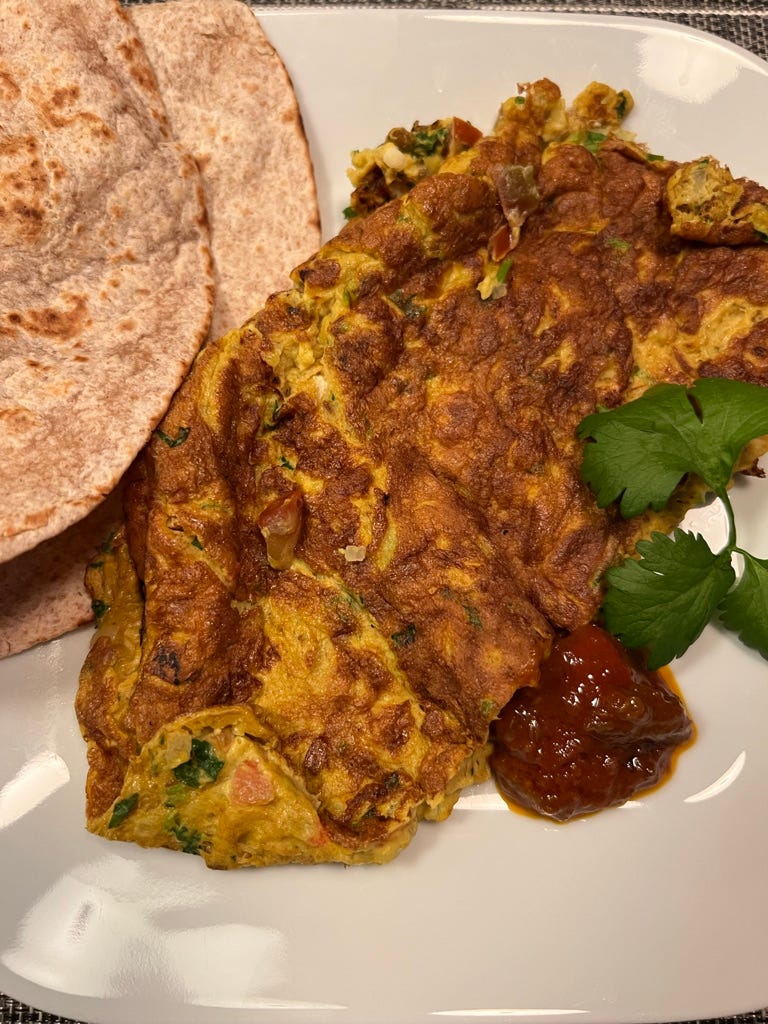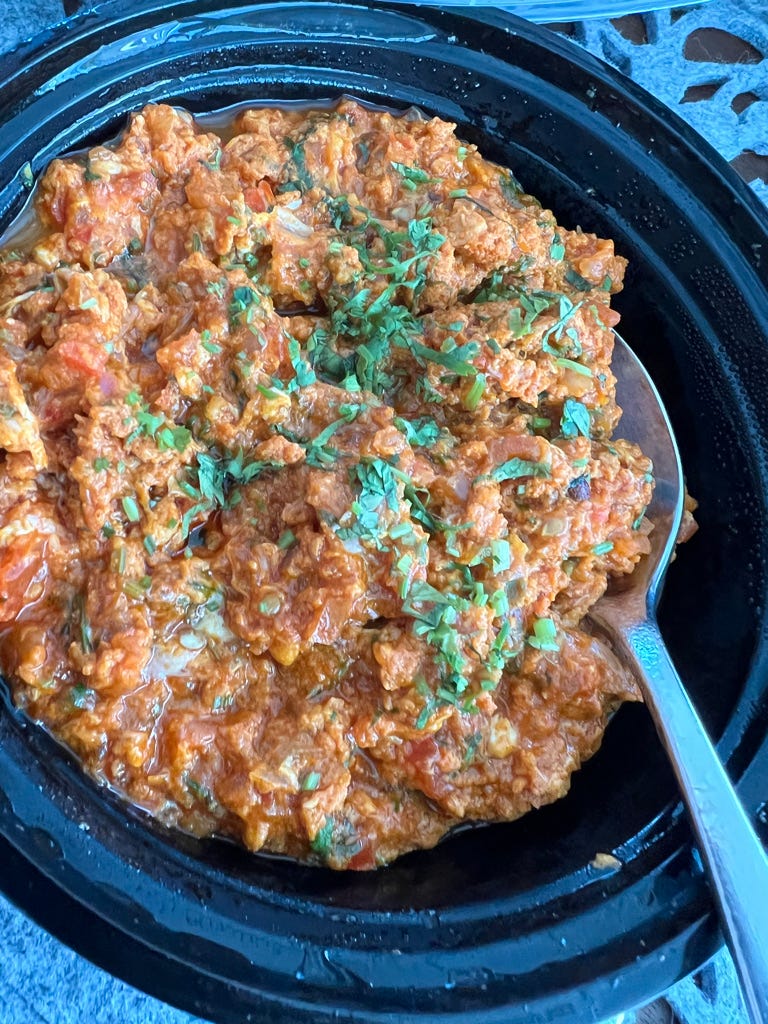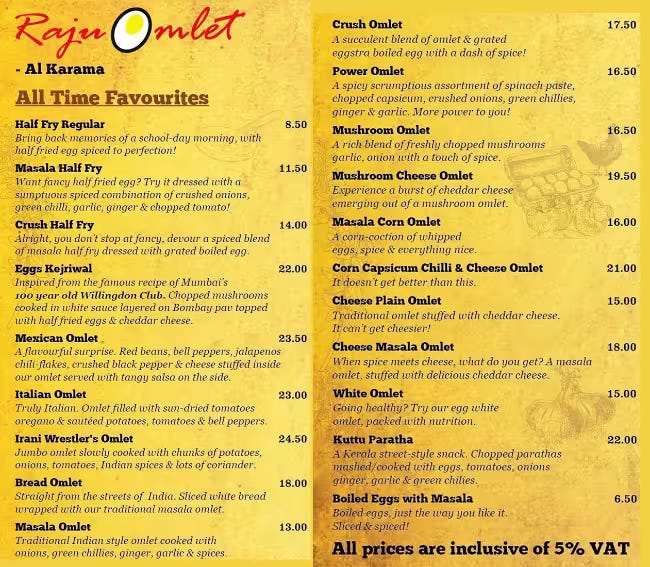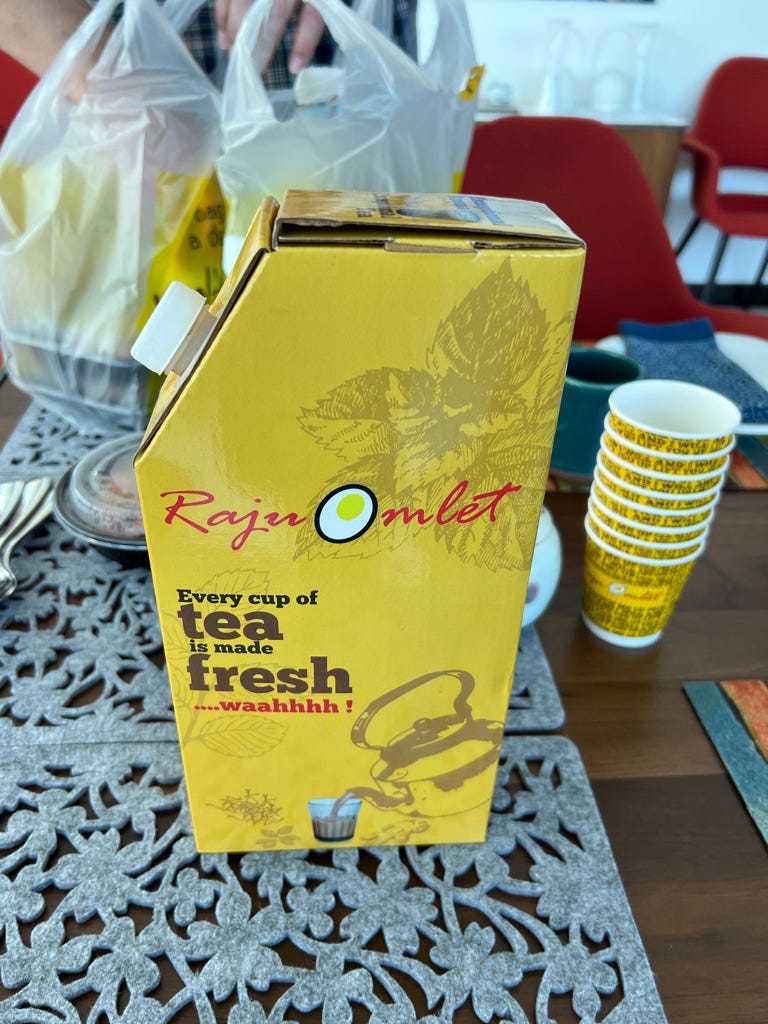Issue #87: When You Can't Get to Raju Omlet
A Dubai Favorite, Indian Breakfast, Masala Omelette Recipe, and Why I'm Here at the MENA's 50 Best Event in the First Place
This week’s dispatch is coming to you from Dubai, where I can take advantage of jet lag and the nine hour time difference to get this out to you earlier than ever. I hope you enjoy it. Next stop on my Middle Eastern tour is Tel Aviv, and then I’ll be home in time to send next week’s newsletter from New York. Thanks, as always, for your support and for sharing your enthusiasm for this newsletter with your friends and fellow food lovers.— Mitchell
I’m back in the United Arab Emirates, this time for the World’s 50 Best Restaurants, MENA (Middle East–North Africa) edition. This is the second year of the regional awards and the second year the ceremony is being held in the capital of Abu Dhabi. (More on why I’m here further down.)

This region, especially Dubai, is increasingly home to outposts of a global constellation of chefs, including familiar names like José Andres, Daniel Boulud, Gordon Ramsay, Gaston Acurio, Heston Blumenthal, Pierre Gagnaire, even Dario Cecchini, the Dante-reciting butcher from the tiny Tuscan village of Panzano, who has lent his name to an Australian Wagyu-slinging steakhouse. But these gastro-bate restaurants don’t interest me much.
Instead, I’m generally happier off the beaten path at restaurants and other food establishments that cater to the local community. Not Emiratis, mind you, whom you’ll find in the flashier joints, but the worker communities from around the world who come here for better, if still difficult, lives and who eat better than most of the white-collar expats whom their labor supports. Luckily, I can rely on my friends Judi and Marcus, who’ve lived here for 20 years and who are constantly scouting the best food and hospitality, usually in places that will never make any world’s best lists except my own.
They steer me away from gleaming office towers and fancy hotels down side streets and back alleys to places that don’t have addresses, where servers come to your car window to take your order while you are stopped in congested streets. Within just an hour of landing at the Dubai airport, we had consumed an exemplary Lebanese grilled chicken sandwich, a pile of fried cheese rolls, a fragrant karak (local chai), and two different styles of Afghani bread pulled out of a fiery oven seconds before we ate them.
One of my favorite places I look forward to now on each visit is Raju Omlet, a mini chain of tiny Indian breakfast spots that specializes in spiced eggs and chais, though they have very respectable curries, pilaus, and breads. (I guess they are also known for their creative spelling.) The menu is overwhelmingly long so I usually just let Judi and Marcus order. On occasion a server has suggested a favorite dish. We’ve eaten on site and we’ve ordered in. Everything is super delicious, full of spice and flavor, a great pick-me up to start the day. When I go home, I promise myself I will make my own masala omelettes for breakfast, which I do for a while until the jet lag and the cravings wear off.
So, as I’m here again, literally typing while eating yet another yummy breakfast from Raju Omlet, I thought I would share my own recipe for masala omelette (aka desi omelette) with you. It’s a composite of a bunch of recipes I found in books and online, a conversation or two with an Indian chef, and my own experimentation. This scramble makes a delicious breakfast, lunch, or dinner. But to be honest, it is still not as delicious as whatever I’m eating from Raju Omlet as I write. To experience that, you’ll just have to come to Dubai, skip out on your hotel breakfast, and order from Raju for yourself. They deliver.
RECIPE: Mitchell’s Masala Omelette
(Serves 2)

4 large eggs
1/2 teaspoon ground turmeric
1/2 teaspoon ground coriander
Generous pinch salt
Large handful fresh cilantro, leaves and stems chopped
2 tablespoons olive oil
1/2 teaspoon cumin seed
1/2 small onion, finely chopped
1 small green chili, minced
1 ripe tomato or 1 cup cherry tomatoes, chopped
Chutney and chapati for serving
In a small bowl, beat the eggs with the turmeric, coriander, and salt until blended. Add the cilantro and mix well. In a large, preferably nonstick frying pan, heat the oil. Add the cumin seed and let sizzle for a minute or two. Add the onion and green chili and cook until the onion is soft, but not colored. Add the chopped tomato and and cook until it softens and gives off its juice. Pour in the eggs. Use a spatula to move the eggs around as they begin to set in order to evenly distribute the ingredients in the pan. Then let the eggs sit and firm up as an omelette. You can pull back the edges to allow more liquid egg to meet the pan. These eggs should cook a little longer than you might prefer for another preparation. The edges of the omelette should crisp. When set and the edges have curled a little off the sides of the pan, remove from the heat. Let sit another minute or so to loosen from the pan and then transfer to a plate, folding the omelette in half as you slide it out. Serve with a good chutney and chapati or other Indian bread. Or toast.
Back to 50 Best
Now, about the awards. After having written a reflection on my conflicted feelings about restaurant awards in general and the World’s 50 Best in particular, following their ceremony in London last July, I didn’t expect to be back at one of their events again so soon. The idea of ranking the world’s restaurants still seems like a silly exercise to me. Even if one could somehow eat in and evaluate all of the restaurants in the world on in any region, the inherent bias in a system that relies on the capitalization and publicity restaurants receive in order to garner the attention needed to break through the global hype machine is inherently unfair. And this is before taking into account how a restaurant operates, what its sustainability practices are, how it bolsters its community or supports it staff.
When I was building the Women’s Entrepreneurial Leadership program at the James Beard Foundation several years ago, we learned that women and minorities cannot find funding for businesses at anywhere near the same success rate as men (which itself is pitifully low in the restaurant business). We learned that journalists, both men and women, and other stakeholders, including diners, gravitate toward the bravado of cocksure men, who tell their stories with exaggerated confidence and ambition. The cards are stacked against even those who are open to change. In short, the system is inequitable.

Yet, as you know if you’ve been following along with me here and on Instagram, I’m working on two projects striving to cultivate and nurture the food culture of Israel: Asif: Culinary Institute of Israel and the Galilee Culinary Institute, which produces my What’s Burning podcast. Having worked for almost 30 years at the James Beard Foundation, I recognize the power that global attention can have in building support for a country’s cuisine and its practitioners, both internally and externally. For a small, complicated country like Israel, which has been isolated from the region in which it sits for so long, its chefs and restaurants being included in a list such as MENA’s 50 Best Restaurants is an important and impactful milestone, indeed.
Five of the 50 restaurants from the 19 countries that constitute the MENA region were from Tel Aviv. A sixth was designated the “One to Watch,” and OCD, which came in at #14 also received an award for being the most sustainable restaurant of the region. Regardless of the accuracy of the rankings, this is hugely important, not only for those chefs and restaurants themselves, but for Israel’s food community. The Israeli chefs all came to Abu Dhabi to accept their honor, itself unimaginable just a few years ago. That they were in the same room, on the same list as the famous Palestinian chef Salam Dakkak of Dubai’s Bait Maryam restaurant, who took home the Best Female Chef of the region award, is not lost on anyone.
Sheril Berger, the chef/co-owner with her twin sister of the tiny plant-based Opa in Tel Aviv that was chosen the “One to Watch” in the region, confirmed the recognition was important. Creating and sustaining a no-waste, vegetarian, dégustation-menu restaurant by themselves is not easy. However questionable the rankings may be—the top 50 included global brands like Zuma (twice!) and Hakkasan—she said the struggle of a chef doing something new and innovative is validated both at home and abroad by this sort of attention.
So there are things to be gained despite the flaws in the system. And therein lies the power and attraction of these sorts of awards. How great will it be if/when someone creates a mechanism for recognizing and supporting all the hard work that goes into making a successful restaurant that doesn’t rely on the assumed necessities of corporate sponsorship and media impressions? I really didn’t think I’d be back at an event like this anytime soon. And I’m pretty sure this isn’t the last one you’ll see me at. What I’m perhaps happiest about returning to next year’s MENA’s 50 Best is that I’ll have another opportunity to enjoy breakfast from Raju Omlet.







